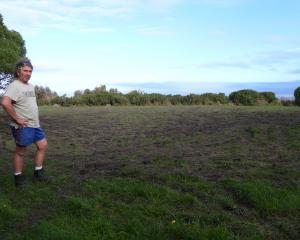
Before the farms can get off the ground, they will have to get through a stringent resource consents process with Environment Canterbury (ECan), he said yesterday.
However, at least two environmental groups - the Central South Island Fish and Game Council and Forest and Bird - will be keeping a close watch on progress.
Both said yesterday it was difficult to be specific until more was known about the individual applications, but there were general principles they would adhere to when assessing them.
The Otago Daily Times revealed yesterday ECan had six resource consent applications to discharge dairy effluent from up to 22,530 dairy cows in the upper Waitaki basin.
Mr Williamson sounded a note of caution over opposition to the dairy farm plans - "don't panic just yet" was his advice.
However, Mr Williamson was surprised at the extent of applications.
Nonetheless, it was not up to him to judge whether there should be dairying in the region, he said.
"If they can meet all the environmental standards and they are not going to degrade waterways, I don't see there is any problem with me or anyone else," he said.
Mr Williamson said applicants would have "to go through a lot" to get resource consents for new dairy farms.
One of the proposed dairy farms just south of Omarama wanted water from the Ahuriri River, which would be difficult because there was a national conservation order over it.
The first requirement would be to get consent for water for irrigation and stock.
The second would be consents to discharge dairy effluent.
Applicants would have to meet high environmental standards, particularly in relation to preserving the existing quality of streams, rivers, lakes and groundwater in the area.
Mr Williamson said if they could address the environmental issues, there would be huge benefits for the local economy and more jobs in the area.
Central South Island Fish and Game Council chief executive Jay Graybill could not be specific at this stage about his organisation's approach.
"Apart from two of the applications, the others are in the very early stages. We haven't even seen those applications," he said.
In general terms, his council had concerns about dairy effluent discharge because of the potential effects on ground and surface water quality in the area.
Mr Graybill said the council's approach was to lodge submissions with ECan and then seek very strong conditions on the consents to maintain water quality.
These would include the volume of the discharge, the degree of dilution, installation of flow meters, an effluent management plan and sampling of groundwater through bores and surface water, with results provided to ECan.
A review clause would be linked to water quality, and if it deteriorated action would be taken.
The council also wanted a short term for the consents so when it came up for renewal, effects on water quality could be taken into account.
"At the end of the day, it is over to ECan to make sure all those conditions are met," he said.
Forest and Bird conservation officer Dean Baigent-Mercer agreed with Fish and Game's views.
He said Forest and Bird would be monitoring the situation closely to determine the approach it would take.












